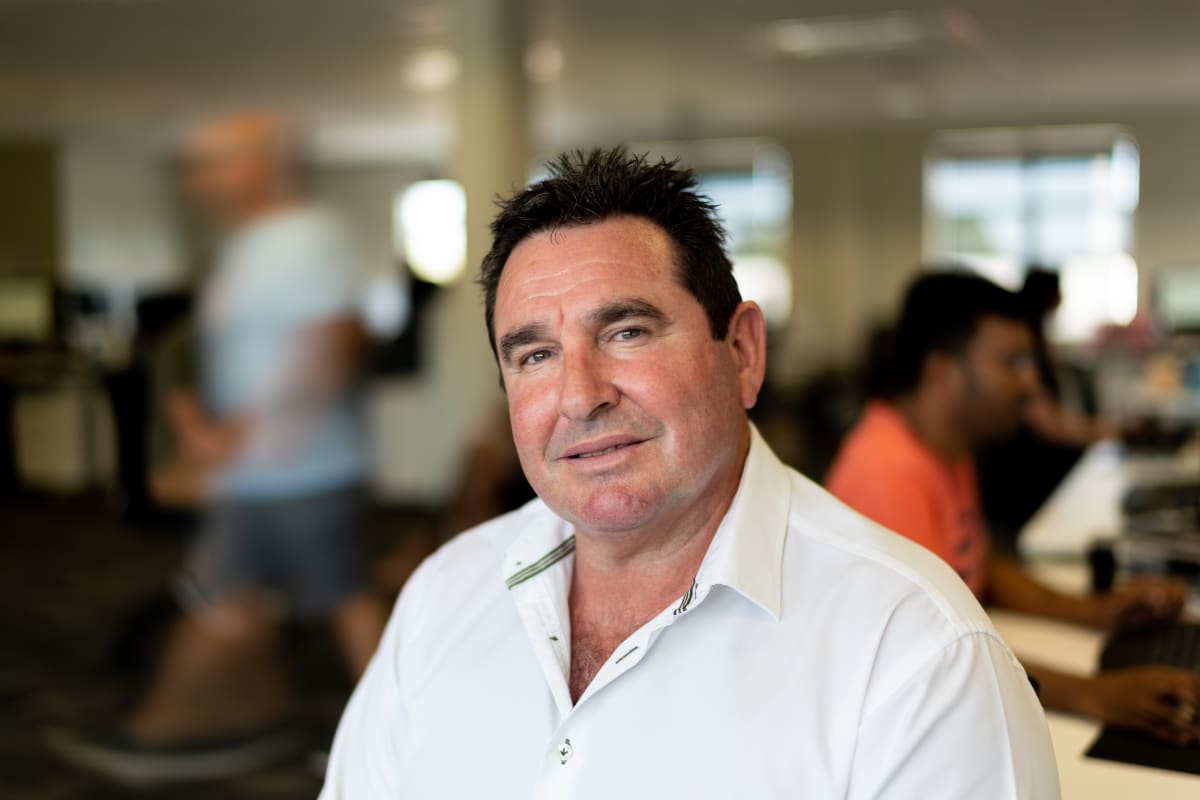
With tough new modern slavery legislation potentially in place by the end of the year, a Hawkes Bay-based company is set to launch a product to help businesses meet their obligations – ethical and legal
It started with fruit. An approach back four years ago from pipfruit industry body New Zealand Apple and Pears to Chris O’Reilly, head of Hawkes Bay-based worker survey company Ask Your Team.
The message was basically: Our members want to be be good employers, to make sure they have no worker exploitation or modern slavery in their supply chain. But how can they be sure?
Can you help us?
The NZ Apple and Pear leadership, like many in the horticulture and other low-wage sectors, had been horrified when it became clear modern slavery wasn’t just something happening ‘over there’. It was a New Zealand problem too.
Investigators found Pacific Island and Asian workers lured to New Zealand with promises of well paying jobs and work permits, who ended up with exploitative pay and conditions. In extreme situations they had their passports taken away, and suffered physical abuse.
Orchards were a high risk area. Workers, many with little English, could be isolated away from outsiders; no one knew what was going on.
One of the worst cases modern slavery cases in recent years involved Samoan-born orchardist Joseph Auga Matamata, who went on trial in the Napier High Court in 2020 after a long investigation. Matamata was charged with 11 counts of human trafficking and 13 of dealing in slaves. The exploitation had been going on for 25 years.

NZ Apples and Pears member companies wanted to make sure this wasn’t happening on their farms.
“They told us their clients relied on overseas migrant labour and they wanted to do the right thing,” O’Reilly says. “But how could they be sure exploitation wasn’t happening, how could they find out if it was, and how could they prove it to customers and Government if it wasn’t?”
The apple industry body was already working with Ask Your Team on worker surveys around company culture and other issues. Now they wanted to know if similar technology could be used to combat modern slavery and exploitation.
“They asked us ‘Could we take the same anonymous survey technique, but adapt it for apple and pear industry workers?”

Ethical VOICE was born, with Ask Your Team using United Nations, International Labour Organisation and OECD worker rights guidance on business, human rights and exploitation to put together questions for orchard staff.
Traditionally, the typical modern slavery auditing system involves third party investigators visiting farms or factories here or overseas, often on scheduled days, and interviewing a small percentage of workers. The problem is that system is open to abuse by unscrupulous company owners, who clean up sites, hand-pick staff and even bribe or intimidate auditors.
For more on the horrors of workplace auditing, see Newsroom’s story Are we buying slave-picked tinned tomatoes?
By contrast, the Ethical VOICE technology involves all workers in an organisation being given a link to an anonymous survey, which they can fill out on their phone or laptop, at work or home. They are asked questions about their workplace pay and conditions.
A pilot last year involving 4000 migrant workers working for five of the largest New Zealand apple companies found many orchards where everything was going fine - but some places where they weren’t, O’Reilly says.
“Toxic pockets can occur, even in companies with the best-intentions. Workers told us about things like inappropriate deductions of payment for transport or accommodation, not having access to sick leave, problems with contracted hours, problems with bullying - sometimes management or sometimes intra-ethnicity. There was a case where a group of workers were bringing a hierarchy from their home country and using it to extort money from colleagues.
“These were things companies didn’t know were happening.”
Modern Slavery legislation
The launch of the Ethical VOICE product towards the end of this month comes as New Zealand's Government receives final submissions on its modern slavery legislation discussion document “A legislative response to modern slavery and worker exploitation”
The proposal was developed by a government-appointed Modern Slavery Leadership Advisory Group chaired by former Air New Zealand and Icebreaker boss Rob Fyfe. Members of the group came from business, non-governmental organisations, unions and academia.
As it stands - and submissions close on June 7 - New Zealand’s modern slavery legislation would require all Kiwi companies, big or small, to take ‘reasonable and proportionate’ action if they became aware of modern slavery in their operations and/or their domestic and international supply chains, or if they found worker exploitation in their New Zealand business.
Meanwhile, there would be mandatory reporting requirements on medium and large organisations (annual revenue over $20 million) to disclose the steps they are taking to address modern slavery and worker exploitation.
Large organisations (annual revenue over $50 million) would have to undertake due diligence to prevent, mitigate and remedy modern slavery in their global operations and supply chains, and also worker exploitation in their domestic operations and supply chains.
These measures, if enacted, would make New Zealand’s modern slavery legislation tougher on companies than that in either Australia or the UK, which have had regulation since 2018 and 2015 respectively, says Bell Gully lawyer Richard Massey.

There is also the possibility directors could be held personally liable for breaches, and penalties might be anywhere from $600,000 and $5 million, in line with those given for health and safety and for financial services breaches.
Massey says companies need to start thinking about what they can do to prepare.
“The paper states that there is a wide range of potential measures that could be implemented to prevent and mitigate any identified risks as part of meeting due diligence responsibilities.
“The examples provided include: regularly surveying suppliers, commissioning third-party audits of suppliers’ compliance with human rights and employment standards, and establishing hotlines or whistleblowing channels for reporting of concerns.”
O'Reilly believes the tough due diligence requirements in the New Zealand legislation are a significant improvement on the UK and Australian models, which he says haven't worked.
"In the UK you are required to report your plan, but it's OK to report you have no plan. With due diligence you have to know what's happening and you have to be taking action.
If our draft law goes through, 'willful blindness' - a legal definition around someone who could and should know about something, but deliberately choses not to find out - would not be a defence for a company where modern slavery is found in the supply chain, O'Reilly says.
"It's fantastic."
More than branding
For O’Reilly, Ethical VOICE is a business opportunity - companies and industry bodies could use the worker surveys to meet their modern slavery obligations, buying the product under a software as a service model.
But it’s also something he believes strongly in. His father, Laurie O’Reilly, was Commissioner for Children in the 1990s and instilled values of justice and equity into his kids, Chris O’Reilly says.
“We lived in a house which was basically a drop-in place for street kids.”
GIving up the corporate world - he was general manager of KFC NZ and chief executive of Ascot Hospital before moving to the Hawkes Bay with his family - was about following his passions, O’Reilly says. “Ask Your Team is about organisations valuing their people and involving their people.”
There’s similar motivation for Gary Shaw, social impact manager for KMD brands, the parent company for outdoor clothing and equipment company Kathmandu and surf brand Rip Curl.
Before joining KMD in 2016, Shaw spent 16 years as a police officer and eight years as an anti-trafficking and exploitation investigator. He’s seen the very worst impacts of modern slavery - six year olds being sold in brothels, children working in appalling conditions.

For Shaw, finding and getting rid of exploitation in the supply chain is more than branding or corporate reputation - it’s about justice and responsibility for others.
Shaw was on Rob Fyfe’s Modern Slavery Leadership Advisory Group, and Kathmandu is one of the first companies outside horticulture trialling the Ethical VOICE survey technology.
He says for companies like Kathmandu and Rip Curl, with factories in Asia and southern Europe, verifying work practices is difficult, even with so-called ‘tier one’ suppliers - the final stage producers. It gets even harder when you get to the people picking the cotton to make the clothing.
But Ethical VOICE provides a solution that doesn’t exist at the moment.
“Traditional audits involve a business contracting a third party to go into the final stage production facilities to make sure there is no. This plays a role if it’s something like fire escapes being locked. But with other things you are trying to find - modern slavery or child labour - it’s not effective, because people do a factory tour and then grab a sample of workers - five percent max, mostly people that factory management has chosen.
“They make sure everyone says they are happy, and unsurprisingly the results are usually pretty clean.”
Ethical VOICE is a mind shift, Shaw says. “We have the opportunity to make sure every worker - even down to people in the fields - has a voice. They can say ‘I’m being harassed, or not paid, or my passport has been taken.”







